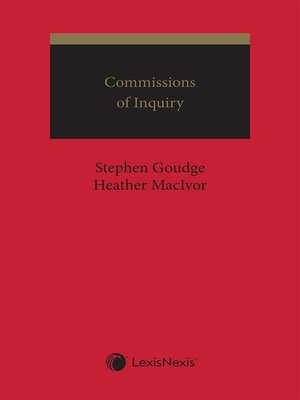
Sign up to save your library
With an OverDrive account, you can save your favorite libraries for at-a-glance information about availability. Find out more about OverDrive accounts.
Find this title in Libby, the library reading app by OverDrive.



Search for a digital library with this title
Title found at these libraries:
| Loading... |
Commissions of inquiry have been part of the Canadian experience since before Confederation. Public inquiries helped to create Canada — think of Lord Durham's Report to Queen Victoria — and their recommendations continue to shape the country in which we live. Yet their popularity has waned in recent years. Concerns about cost and delay may deter governments from setting up inquiries — not to mention concerns about politically damaging revelations in highly publicized hearings. Meanwhile, Canada continues to confront the kinds of issues and events that prompted past governments to establish inquiries. As these words were written, Canadian governments and some First Nations were embroiled in seemingly intractable conflicts over energy pipelines and carbon pricing. Instead of going to court, or turning climate change into a political football, why not appoint an independent inquiry to hear from the interested parties, research the issues, and find some consensus on the way forward?
This book is not a polemic in favour of inquiries. Nonetheless, we think it makes the case for reviving this ancient but highly adaptable institution. Canada can benefit from the experience of other common law countries — and some Canadian provinces — which have revamped their approach to public inquiries. Commissioners still gather and test evidence in costly formal hearings, with their attendant risks to individual reputation and offsetting procedural protections. But they also rely on new types of written evidence and hearing structures, seeking greater efficiency and cost-effectiveness without sacrificing fairness and accuracy. These innovations promise to deliver the substantial benefits of public inquiries without undue expenditure of time and money.
This book will prove valuable, not just to future Commissioners and their staff, but to anyone with an interest in Canadian public law and politics.






